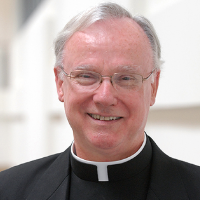
Readings:
Reading 1: Isaiah 42:1-4, 6-7
Responsorial Psalm: Psalm 29:1-2, 3-4, 3, 9-10
Reading 2: Acts 10:34-38
Gospel: Mark 1:7-11
The gospel passage for this Sunday stands at the very beginning of Mark’s Gospel and is typical of this evangelist’s no-nonsense style. We will hear readings from this Gospel all throughout the liturgical year 2021. Today, on this feast of the Baptism of the Lord, Mark’s dramatic and powerful account of Jesus’ mission begins.
Unlike the other three Gospels, there is no run-up to the beginning of Jesus’ public ministry — no account of Jesus’ remote origins, or his conception, or the circumstances of his birth. With Mark’s account, we first meet Jesus as a young adult, as he comes south from Nazareth to the borders of the Judean desert where the prophet John the Baptist is dramatically challenging his people to repentance, urging them to wash their lives clean in the waters of the Jordan River. While large crowds come from nearby Jerusalem, drawn by John’s magnetic force, the focus falls on a single pilgrim from Galilee in the north, Jesus of Nazareth.
Mark tells us that John had anticipated the appearance of this “stronger one” who will bring a baptism not just of water, but of the “Holy Spirit.” And Jesus, the holy one of God, has at last come and, in a spirit of solidarity with his people, he, too, plunges into the Jordan as a sign of beginning a new life.
But there the comparison with the others who flock to John ends. In short, quick strokes, Mark describes Jesus entering the Jordan — the river that Israel had crossed on its way to the promised land — and as he comes up out of the waters, the heavens are torn open and the Spirit of God descends upon Jesus, suffusing him with God’s own power. At that moment, the voice of God booms across the heavens: “You are my beloved Son; with you, I am well pleased.” The evangelist shares with the readers and hearers of this Gospel what is still unknown to the crowds. Right from the outset, we learn Jesus’ awesome identity as the beloved Son of God, the “strong one” who is filled with the Spirit of God, and who immediately begins his mission of healing, of confronting evil, of bringing justice. One who ultimately would give his very life for the sake of his people.
From the vantage point of Christian faith, the other Scripture readings for this Sunday anticipate this dramatic scene. Isaiah transmits the word of the Lord about his “chosen one with whom I am pleased, upon whom I have put my spirit.” The one “who shall bring forth justice to the nations,” who will “open the eyes of the blind…bring out prisoners from confinement, and from the dungeon those who live in darkness.” The responsorial Psalm 29 praises God whose “voice…is over the waters, The Lord, over vast waters. The voice of the Lord is mighty; the voice of the Lord is majestic.” The same voice that thundered over the Jordan in our gospel scene.
And the second reading is from the key turning point in the Acts of the Apostles when Peter baptizes the Roman centurion Cornelius and his household — the first Gentiles to be incorporated into the Christian community — the first fruits of Jesus’ universal mission.
Ancient Judaism understood well the symbolic meaning of cleansing with water as a sign of a renewed life. Devout Jews performed ritual cleansing before prayer or before entering the temple. The group of dedicated Jews at Qumran — not far from where John performed his baptisms — took ritual baths several times a day to maintain their sense of dedication to God alone. Yet the Gospels portray Jesus’ baptism as something unique. A sign of renewal and dedication, yes. But, as Mark’s Gospel describes, even more a disclosure of Jesus’ true identity as Son of God and vessel of the Spirit.
Jesus’ baptism foreshadows our own baptism: fashioned as daughters and sons of God, filled with God’s Spirit, commissioned to bring God’s love and justice to the world. This feast invites us to think of the very foundation of our faith as Christians — our belief in Jesus as the Son of God; belief in ourselves as Spirit-filled children of God.
Rev. Donald Senior, CP
President Emeritus, Chancellor